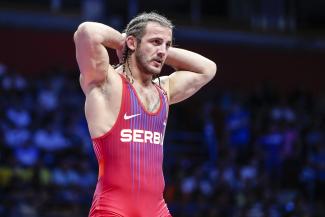UWW Appeal Committee concludes investigation into Olympic qualification match
Wednesday, May 29, 2024 - 15:00 By United World Wrestling Press

CORSIER-SUR-VEVEY, Switzerland (May 29) -- The United World Wrestling (UWW) Appeal Committee has reached a decision regarding the appeals filed against the UWW Disciplinary Chamber's ruling dated April 23, 2024, concerning the officiating of Match 266 (ITA vs AZE) at the European OG Qualifier in Baku, Azerbaijan.
After carefully considering the statements from the refereeing officials involved (Alexei Bazulin, Roman Pavlov, Ibrahim Cicioglu, Kamel Bouaziz, and Casey Goessl), the reports of the two review panels, and the opinions of impartial refereeing experts, the Appeal Committee concluded that there was no indication of bias in the officiating of the match. The issues identified were determined to be related to refereeing errors and technical aspects of officiating.
To ensure a fair and proportionate outcome, the Appeal Committee has referred the case back to the UWW Disciplinary Chamber for reconsideration. The Disciplinary Chamber has been instructed to reassess the appropriate sanctions, if any, based solely on the refereeing errors and technical officiating issues in accordance with the relevant UWW rules and regulations.
Considering the above, the Disciplinary Chamber revisited the case and issued the following decision:
Considering the above, in particular, that the appeal panel found that “there is no indication of bias amounting to a breach of the fundamental principles of integrity and fair play in the officiating of Match 266” and that “since this case is about the refereeing errors and questionable decisions of a technical nature”, pursuant to the UWW Regulations and rules the Disciplinary Chamber renders the following revised sanction:
- The suspension against the refereeing delegates (Mr. Bouaziz, Mr. Cicioglu, Mr. Goessl) is reduced until 31 May 2024; notwithstanding the foregoing, the refereeing delegates are reinstated in the selection for the Olympic Games and may be considered, subject to the final selection by the Refereeing Commission and the UWW Bureau, to officiate only as mat chairmen during the Games.
- The suspension against Mr. Bazulin is reduced until 31 May 2024; notwithstanding the foregoing, Mr. Bazulin is reinstated in the selection for the Olympic Games and may be considered, subject to the final selection by the Refereeing Commission and the UWW Bureau, to officiate as referee during the Games.
- The suspension against Mr. Pavlov is reduced to the same period as the judge’s, i.e. until 30 September 2024.
The UWW remains committed to upholding the integrity of the sport and ensuring that all competitions are conducted fairly and in accordance with the rules and regulations.


Share your thoughts.
Comments